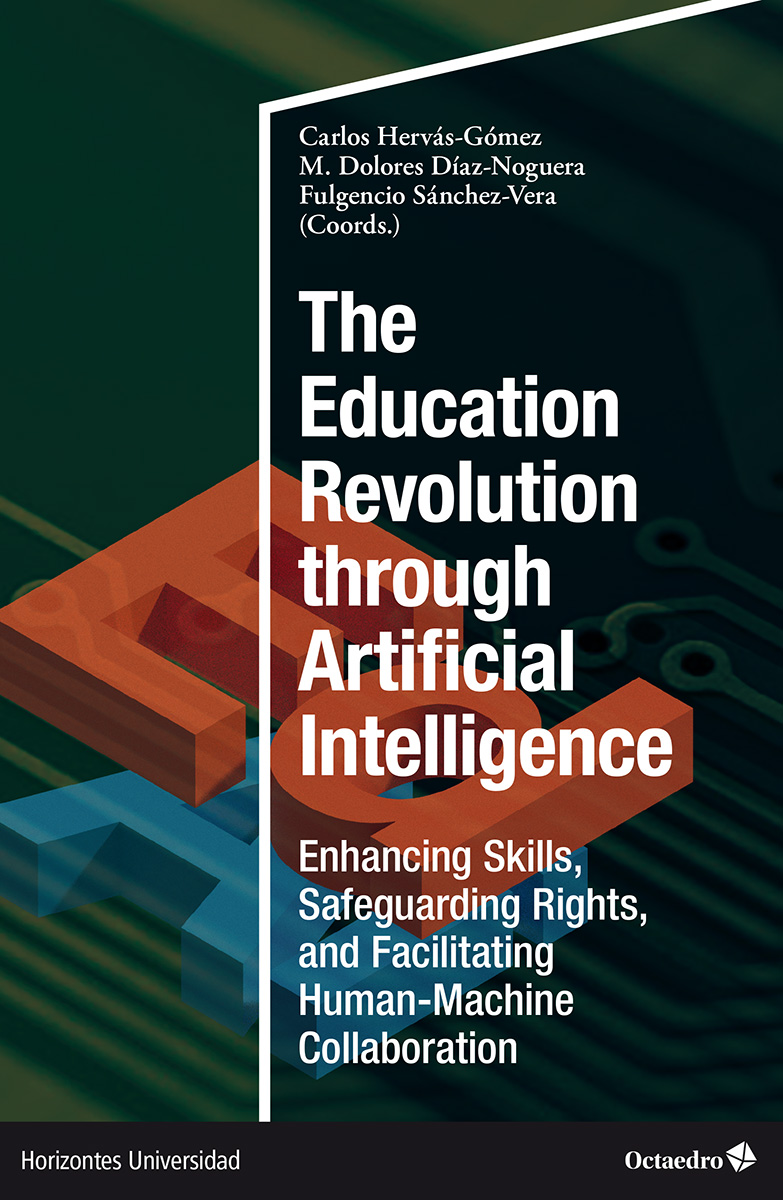Nota de prensa
FICHA TÉCNICA
The Education Revolution through Artificial Intelligence
Coordinación: Carlos Hervás-Gómez, María Dolores Díaz-Noguera, Fulgencio Sánchez-Vera
OPEN ACCESS
Presentación
This book is a fundamental work that explores how AI is transforming the educational landscape. Through a critical and ethical lens, the authors address AI’s potential to enhance skills, safeguard rights, and promote collaboration between humans and machines. From academic research to the creation of innovative educational content, this book provides a comprehensive guide for educators, students, and researchers in the digital age. It is a call to action for the conscious integration of AI into the education of the future.
Índice
Prologue
1. Introduction to Artificial Intelligence in Education (PhD Carlos Hervás-Gómez; PhD M. Dolores Díaz-Noguera; Eduardo Puraivan; Mg. Macarena Astudillo-Vásquez; Mg. Connie Cofré-Morales)
2. Artificial Intelligence and Education: Is It Necessary, Is It Convenient? (PhD Enrique Estellés-Arolas; PhD Javier Pérez Bou)
3. The Inclusion of Artificial Intelligence in Higher Education: Moving Towards a digital Educational Transformation (María Jesús Santos Villalba; José Antonio Martínez Domingo; Blanca Berral Ortiz; Manuel Enrique Lorenzo Martín)
4. The Ethical and Epistemic Impact of Artificial Intelligence in Education (Inmaculada Perdomo Reyes; Fulgencio Sánchez-Vera; Betty Estévez Cedeño)
5. From Theory to Practice with Artificial Intelligence: Experience of Project-based Learning in Higher Education (PhD Arasay Padrón Alvarez; PhD Vladimir A. Rosas Meneses)
6. The Role of the Faculty Member as an Ethical mentor in the Use of AI in the Academic Field. Ethical perception using ChatGPT in the writing of academic essays (PhD Alazne Ciarra Tejada; PhD Diego Ernesto Parra Sánchez)
7. Integrating AI into Academic Research: How We Navigate the Inevitable Ethically (PhD Helen Hendaria Kamandhari; PhD Silvia Lavandera Ponce; PhD Begoña Mora Jaureguialde)
8. Integrating Generative AI into Analytical Practices in Qualitative Inquiry (PhD María Paz Sandín Esteban; PhD Angelina Sánchez Martí; PhD Ruth Vilà Baños)
9. Redefining Language Education in the AI Era: Challenges, Opportunities and Perspectives (Miguel Cuevas-Alonso; Pablo M. Tagarro)
10. Navigating AI Integration in Higher Education: Ethical Challenges and Pathways for Comprehensive Human Development (PhD Luis Moral Moreno; PhD José Luis Guzón Nestar; PhD Ana Martínez Hernández; PhD Paula Gil Ruiz; PhD Rubén Iduriaga Carbonero)
11. Improving Learning through Automatic Generation of AI-Based Narratives (María Ribes-Lafoz; Borja Navarro-Colorado; María Tabuenca-Cuevas; José Rovira-Collado)
12. Perceptions of Artificial Intelligence among Students in the Faculty of Education (PhD Ángela Martín-Gutiérrez; PhD Jesús García-Jiménez; PhD María del Carmen Corujo-Vélez; PhD Carlos Hervás-Gómez)
13. Artificial Intelligence Tools for the Creation of Educational Videos for Teaching (PhD Carlos Hervás-Gómez; PhD María Dolores Díaz-Noguera; PhD Emilia Florina Grosu; PhD Liliana MâȚĂ; PhD Sonia Gabriela Neagu; María de los Ángeles Domínguez-González)
14. “I learn better with Dall·E”: Using Prompts for Self-regulation of Learning with Primary Education Pupils (PhD Celia Moreno-Morilla; Manuel Reina-Parrado; PhD María Navarro-Granados)
15. Automatic Short Answer Grading in Health Sciences with ChatGPT (PhD Nuria Padros-Flores; Ivan Gadea Sáez; PhD Carolina Alonso-Montero)
Carlos Hervás-Gómez, Fulgencio Sánchez-Vera, María Dolores Díaz-Noguera
9788410282582
09651-1
